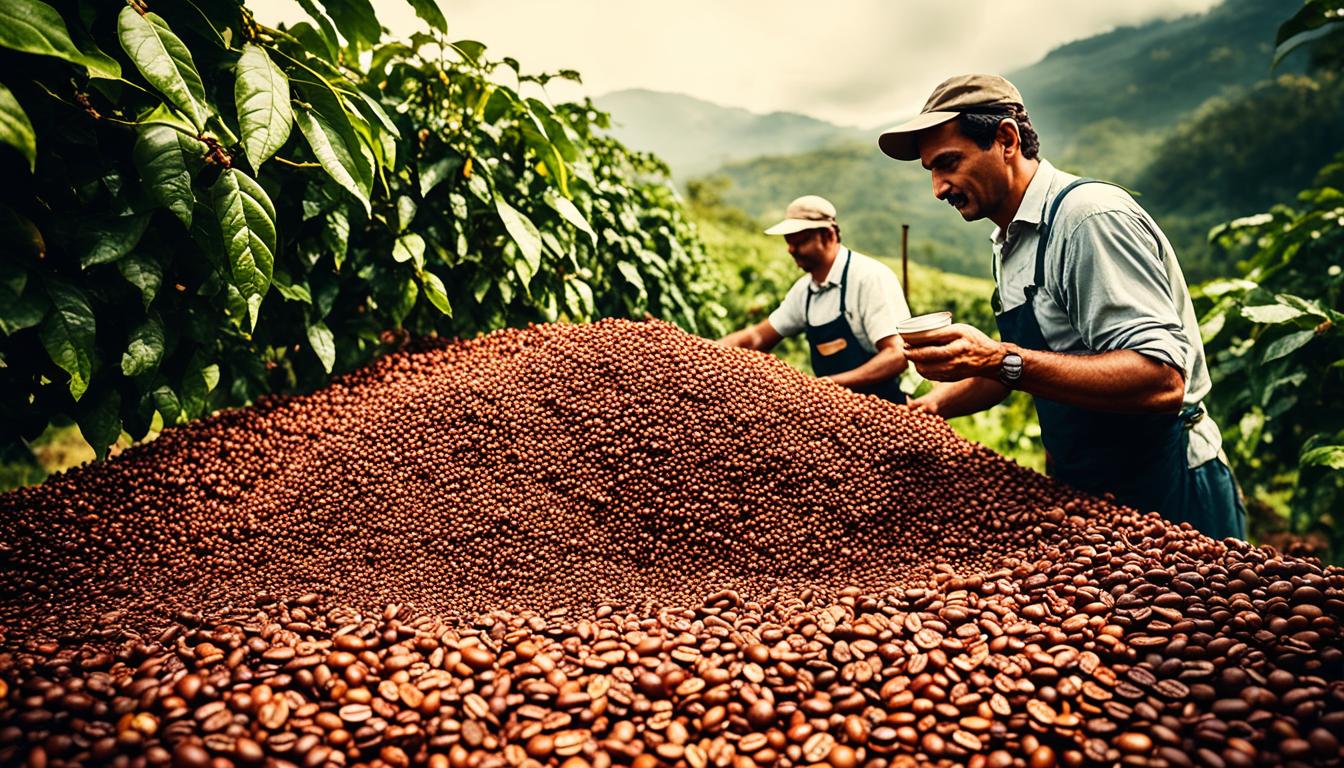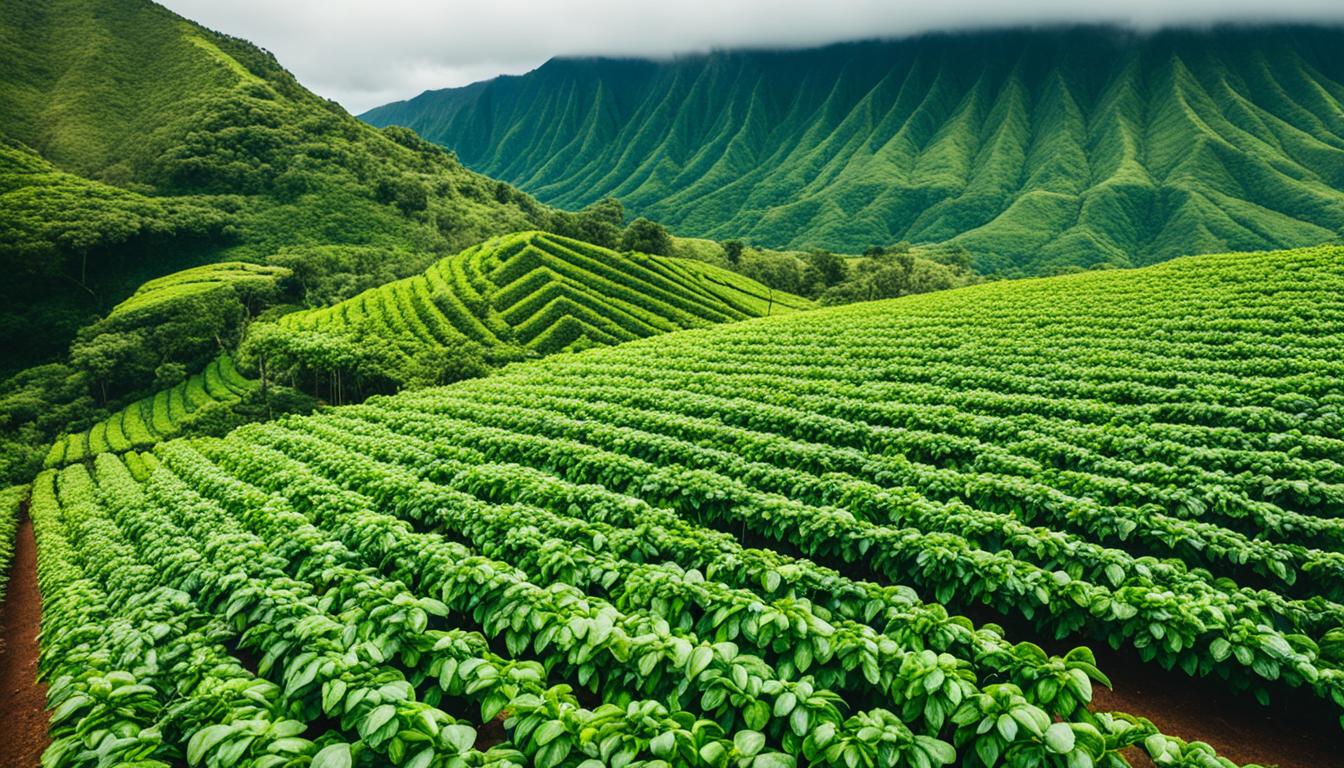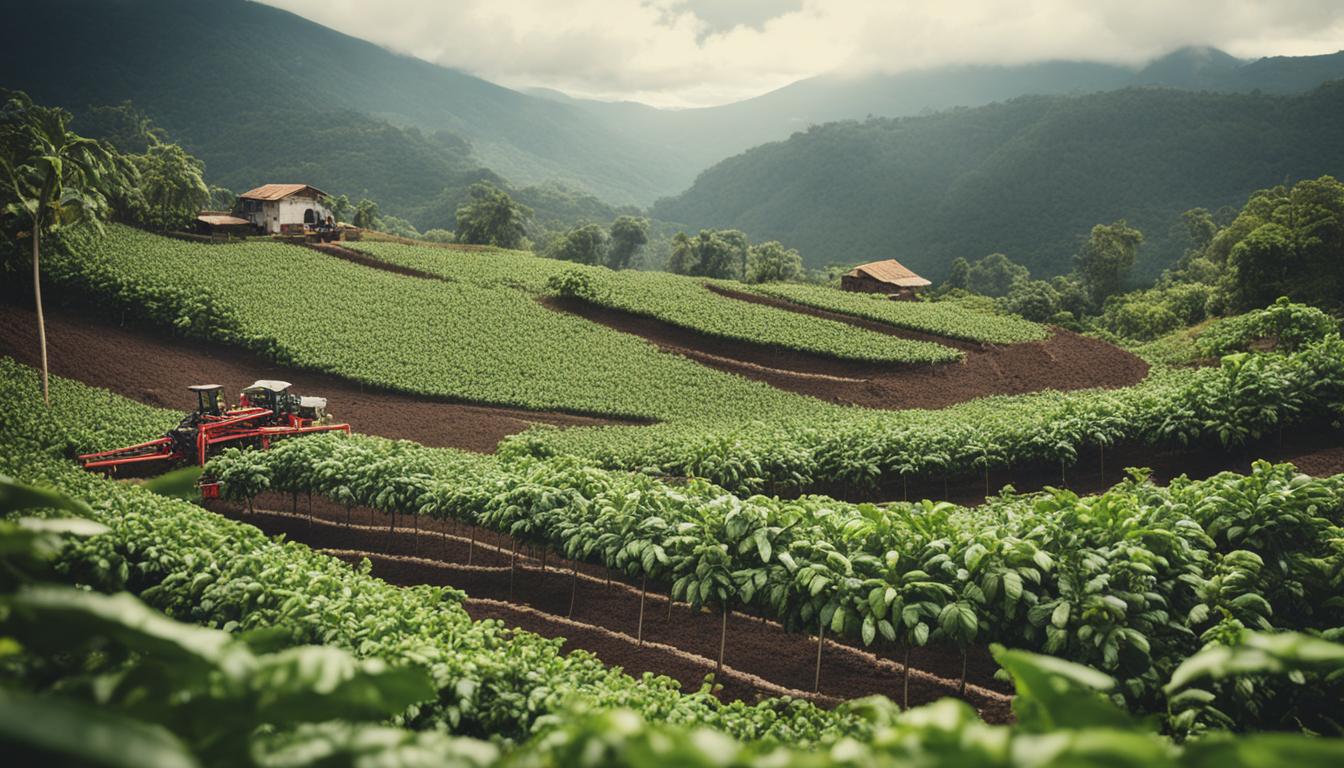Globally, coffee has become much more than just a beloved beverage. It has emerged as a key player in driving economic development. The coffee industry has seen tremendous growth in recent years, with significant contributions to national economies and job creation. In this article, we will explore the role of coffee in economic development, examining its impact on production, market influence, and trade benefits.
According to the National Coffee Association, the economic impact of the coffee industry in the United States reached a staggering $343.2 billion in 2022. This translates to a remarkable 52.4% increase since 2015. It’s clear that the coffee market wields significant influence, as consumers spent nearly $110 billion on coffee in 2022 alone. Additionally, with over 2.2 million jobs created and more than $100 billion in wages generated, the coffee industry plays a crucial role in sustaining and growing various sectors of the economy.
Key Takeaways:
- Coffee’s economic impact in the United States in 2022 was $343.2 billion, showing a significant increase from 2015.
- Consumers spent almost $110 billion on coffee in 2022, highlighting the market’s strong influence on the economy.
- Over 2.2 million jobs are supported by the coffee industry in the United States, generating more than $100 billion in wages.
The Economic Impact of Coffee Consumption
The consumption of coffee has a profound impact on the economy, contributing to GDP growth and providing economic opportunities in various countries. Coffee exports play a crucial role in stimulating economic development, particularly in major coffee-producing nations.
One such country is Brazil, the world’s largest coffee producer. The coffee industry in Brazil heavily relies on coffee cultivation and harvesting, employing over five million people and generating a significant portion of the country’s economy. The coffee exports from Brazil contribute to GDP growth, strengthening the economic foundation of the nation.
The economic impact of coffee consumption goes beyond the production and export of raw coffee beans. The caffeine industry, which encompasses the production of coffee-related products, also makes a substantial economic contribution. The production of coffee-related goods and services creates employment opportunities and generates revenue, further enhancing the economic prosperity derived from coffee consumption.
Economic Contribution of Coffee Consumption
| Benefits | Economic Impact |
|---|---|
| Contribution to GDP | Significant growth through coffee exports |
| Job Creation | Employment opportunities in coffee cultivation, harvesting, and caffeine industry |
| Revenue Generation | Revenue from coffee exports and coffee-related products |
Coffee consumption drives economic growth through trade and provides a robust foundation for financial stability. The economic impact of coffee cannot be underestimated, as it sustains livelihoods, creates jobs, and contributes to the overall prosperity of nations.
As we continue to enjoy our daily cup of coffee, let us appreciate the economic significance behind this beloved beverage. From local coffee shops to global coffee markets, the economic impact of coffee consumption stretches far and wide, nurturing economic growth and improving lives.
The Global Coffee Market and Economic Development
The global coffee market plays a crucial role in economic development. The coffee industry contributes to local and global economies through trade and export. Developing countries, especially in South America, are major coffee producers, while industrialized economies are the primary consumers of coffee.
The coffee trade provides economic benefits to countries involved, stimulating growth and generating revenue. Coffee is one of the most traded agricultural commodities worldwide, resulting in a thriving market that influences the global economy.
When we consider the global coffee market development, we see how it impacts both coffee-producing and coffee-consuming nations. Developing countries that heavily rely on coffee production experience economic growth as they export their coffee to the international market. These exports provide substantial financial returns and contribute to the overall economic development of these nations.
On the other hand, coffee-consuming countries, particularly industrialized economies, benefit from the coffee trade through domestic consumption and retail sales. The demand for coffee fuels economic activity, supporting local businesses, job creation, and revenue generation.
Did You Know?
The coffee industry is not only about brewing a cup of coffee; it is an integral part of the global economy, impacting millions of lives and shaping economic landscapes both locally and globally.
By fostering trade relationships, the global coffee market creates economic interdependencies between nations. This interconnectivity promotes cooperation and strengthens economic ties, leading to shared benefits and sustained growth.
Furthermore, the coffee trade facilitates the flow of capital, knowledge, and technology across borders, contributing to economic development. Coffee production requires expertise in cultivation, harvesting, processing, and distribution, resulting in the transfer of skills and technological advancements to coffee-producing countries.
The Economic Benefits of the Global Coffee Market
The coffee trade offers numerous economic benefits to countries involved:
- Revenue Generation: Coffee exports generate significant revenue for coffee-producing countries, which can be reinvested in social welfare, infrastructure development, and education.
- Job Creation: The coffee industry provides employment opportunities along the entire value chain, from farmers and farm workers to processors, exporters, and retailers.
- Income Generation: Coffee cultivation and trade enable small-scale farmers and local communities to earn sustainable incomes, improving their living standards and reducing poverty.
- Tourism Boost: Coffee-producing regions often attract tourists who are interested in experiencing the coffee culture firsthand, leading to increased tourism and economic growth.
The economic benefits of the global coffee market extend far beyond the coffee itself. They encompass social, environmental, and cultural aspects, positively shaping communities and contributing to sustainable development.

In the image above, we can visually appreciate the dynamic nature of the global coffee market, highlighting its development and impact on economic growth.
Historical Impacts of Coffee on Society and Economic Growth
Coffee has played a significant role in shaping society and driving economic growth throughout history. The expansion of coffee cultivation and trade has led to remarkable advancements in regions where coffee is a major cash crop.
“Coffee is a global beverage that has profoundly influenced the way people live, work, and interact with each other. Its economic and cultural significance cannot be overstated.”
In the early stages of coffee production, there were challenges and dark moments in history. Coffee cultivation was tied to human exploitation, slavery, and even violent civil wars. These injustices cannot be ignored or forgotten, as they have left a lasting impact on the coffee industry’s historical narrative.
Despite these difficult chapters, we must recognize that coffee has transformed societies and influenced economic growth in various regions. The economic impact of coffee production and trade has been substantial, creating opportunities for both individuals and communities.
The Economic Impact of Coffee Production
The production of coffee has had a significant impact on job creation and economic growth. As coffee became a popular and sought-after commodity, many regions dedicated land and resources to coffee cultivation. This shift led to increased employment opportunities and improved living conditions for local communities.
- Coffee production created jobs for farmers, harvesters, processors, exporters, and other related roles. This has provided livelihoods for millions of people worldwide.
- Regions that heavily rely on coffee cultivation have seen economic growth and development, as coffee exports contribute to their GDP.
Coffee Trade and its Influence on the Economy
The coffee trade has been instrumental in stimulating economic growth and benefiting coffee-producing countries. Coffee is one of the most traded agricultural commodities globally, with a vast market that spans across continents.
- Developing countries, particularly those in South America, have become major coffee producers, leveraging the coffee trade to fuel economic growth.
- The global coffee market generates revenue, fosters international trade, and supports economies at both ends of the supply chain – the coffee-producing regions and the consumer markets.
The economic influence of the coffee market extends beyond the coffee-producing nations. Industrialized economies, such as the United States, benefit from the consumption of coffee, which drives revenue and creates employment opportunities domestically.
| Top Coffee-Producing Countries | Major Economic Contributions |
|---|---|
| Brazil | Leading coffee exporter, significant contribution to GDP, employment for millions |
| Colombia | Quality-focused coffee production, international reputation, revenue generation |
| Vietnam | Massive coffee production, international trade, income for farmers |
The table above highlights some of the top coffee-producing countries and their major economic contributions. These nations not only benefit from coffee production but also play a crucial role in satisfying global demand, further driving economic growth within their economies.
While coffee’s historical impact on society and economic growth has been significant, it is essential to acknowledge the challenges and work towards a more equitable and sustainable coffee industry. By supporting ethical sourcing practices and investing in the well-being of coffee-producing communities, we can ensure that coffee continues to positively impact societies and economies around the world.
Conclusion
Coffee is a powerful driver of economic development, playing a crucial role in global markets and supporting the livelihoods of millions of people. The economic impact of the coffee industry cannot be overstated, as it contributes significantly to GDP, job creation, and revenue generation.
The development of the global coffee market has a profound influence on the economy, benefiting both coffee-producing and coffee-consuming countries. The trade of coffee brings about economic advantages, stimulating growth and fostering economic stability.
Despite its complex history, coffee has undeniably shaped society and contributed to economic growth. From the expansion of coffee cultivation to the trade of this beloved beverage, coffee has become an integral part of our lives, leaving a lasting impact on various aspects of society and the economy.
FAQ
What is the role of coffee in economic development?
Coffee plays a significant role in driving economic development globally. It contributes to GDP growth through coffee exports and generates revenue and job opportunities in the coffee industry.
How does coffee consumption impact the economy?
Coffee consumption has a significant economic impact. Coffee exports contribute to GDP growth in many countries, especially those that are major coffee producers. Additionally, the caffeine industry, including the production of coffee-related products, creates jobs and generates revenue.
How does the global coffee market contribute to economic development?
The global coffee market plays a crucial role in economic development. The trade and export of coffee provide economic benefits to countries involved, stimulating growth and generating revenue. Coffee-producing countries rely on coffee cultivation and harvesting, creating employment opportunities and driving their economies.
What historical impacts has coffee had on society and economic growth?
The expansion of coffee cultivation and trade has led to economic growth in regions where coffee is a major cash crop. However, coffee’s history is also connected to human exploitation, slavery, and violent civil wars. Despite these challenges, coffee continues to shape society and contribute to economic growth.




